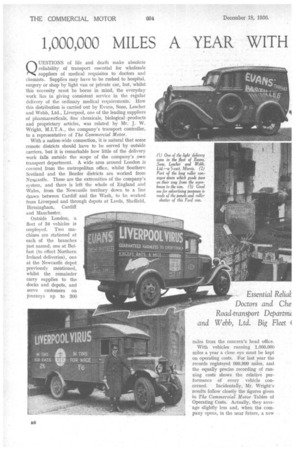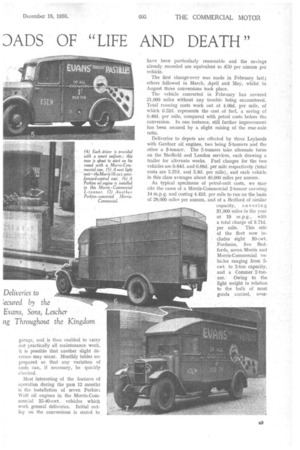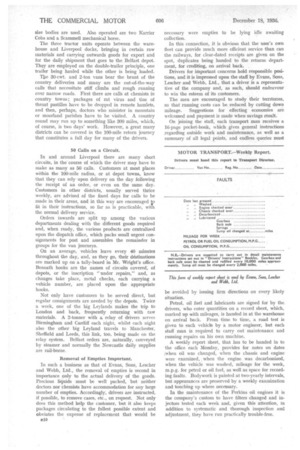1,000,000 MILES A YEAR WITH DADS OF "LIFE AND DEATH"
Page 42

Page 43

Page 44

If you've noticed an error in this article please click here to report it so we can fix it.
QUESTIOINS of life arid death make absolute reliability of transport essential for wholesale suppliers of medical requisites to doctors and chemists. Supplies may have to be rushed to hospital, surgery or shop by light van or private car, but, whilst this necessity must be borne in mind, the everyday ' work lies in giving consistent service in the regular delivery of the ordinary medical requirements. How this distribution is carried out by Evans, Sons, Lescher and Webb, Ltd., Liverpool, one of the leading suppliers of pharmaceuticals, fine chemicals, biologicalproducts and proprietary articles, was related by Mr. J. W. Wright, M.I.T.A., the company's transport controller, to a representative of The Commercial Motor.
With a nation-wide connection, it is natural that some remote districts should have to be served by outside carriers, but it is remarkable how little of the delivery work falls outside the scope of the company's own transport department. A wide area around London is covered from the metropolitan office, whilst Southern Scotland and the Border districts are worked from Newcastle. These are the extremities of the company's system, and there is left the whole of England and Wales, from the Newcastle territory down to a line drawn between Cardiff and the Wash, to be worked from Liverpool and through depots at Leeds, Sheffield, Birmingham, Cardiff and Manchester.
Outside London, a fleet of 84 vehicles is employed. Two machines are stationed at each of the branches just named, one at Belfast (to effect Northern Ireland deliveries), one at the Newcastle depot previously mentioned, whilst the remainder carry supplies to the docks and depots, and serve customers on journeys up to 300 miles from the concern's head office.
With vehicles running 1,000,000 miles a year a close eye must be kept on operating costs. For last year the records registered 990,999 miles, and the equally precise recording of running costs shows the relative performance of every vehicle con
cerned. Incidentally, Mr. Wright's results follow closely the figures given in The Commercial Motor Tables of Operating Costs. Actually, they average slightly less and, when the company opens, in the near future, a new
garage, and is thus enabled to carry out practically all maintenance vrork, it is possible that another slight decrease may occur. Monthly tables are prepared so that any variation of costs can, if necessary, be quickly checked.
Most interesting of the features of operation during the past 12 months is the installation of seven Perkins Wolf oil engines in the Morris-Commercial 35-40-cwt. vehicles which work general deliveries. Initial outlay on the conversions is stated to have been particularly reasonable and the savings already recorded are equivalent to £50 per annum per vehicle.
The first change-over was made in February last; others followed in March, April and May, whilst in August three conversions took place.
The vehicle converted in February has covered 21,000 miles without any trouble being encountered. Total running costs work out at 4,06d. per mile, of which 0.52d. represents the cost of fuel, a saving of 0.46d. per mile, compared with petrol costs before the conversion. In one instance, still further improvement has been secured by a slight raising of the rear-axle ratio.
Deliveries to depots are effected by three Leylands with Gardner oil engines, two being 5-tonners and the other• a 3-tonner. The 5-tonners take alternate turns on the Sheffield and London services, each drawing a trailer for alternate weeks. Fuel charges for the two vehicles are 0.84d. and 0.88d. per mile respectively (tOtal costs are 5.37d. and 5,8d, per mile), and each vehicle in this class averages about 40,000 miles per annum.
As typical specimens of petrol-unit costs, we may cite the cases of a Morris-Commercial 2-tonner covering 14 m.p.g. and costing 4.42d, per mile to run on the basis of 28,000 miles per annum, and of a Bedford of similar capacity, covering 31,000 miles in the year at 19 m.p.g., with a total charge of 3.71d. per mile. This side of the fleet now includes eight 30-cwt. Fordsons, five Bedfords, seven Morris and Morris-Commercial vehicles ranging from 5cwt. to 2-ton capacity, and a Cornmer 2-tonner. Owing to the light weight in relation to the bulk of most goods carried, over size bodies are used. Also operated are two Karrier Cobs and a ScammeII mechanical horse.
The three tractor units operate between the warehouse and Liverpool docks, bringing in certain raw materials and carrying outwards goods for export and for the daily shipment that goes to the Belfast depot. They are employed on the double-trailer principle, one trailer being hauled while the other is being loaded.
The 30-cwt. and 2-ton vans bear the brunt of the country deliveries and many are the out-of-the-way calls that necessitate stiff climbs and rough running over narrow roads. First there are calls at chemists in country towns; packages of rat virus and tins of throat pastilles have to be dropped in remote hamlets, and then, perhaps, doctors who minister in mountain or moorland parishes have to be visited. A country round may run up to something like 300 miles, which, of course, is two days' work. However, a great many districts can be covered in the 100-mile return journey that constitutes a full day for many of the drivers.
50 Calls on a Circuit.
In and around Liverpool there are many short circuits, in the course of which the driver may have to make as many as 50 calls. Customers at most places within the 100-mile radius, or at depot towns, know that they can rely upon delivery on the day following the receipt of an order, or even on the same day. Customers in other districts, usually served thrice weekly, are advised of the fixed days for calls to be made in their areas, and in this way are encouraged to fit in their instructions, so far as is practicable, with the normal delivery service.
Orders inwards are split up among the various departments dealing with the different goods required and, when ready, the various products are centralized upon the dispatch office, which packs small urgent consignments for post and assembles the remainder in groups for the van journeys.
On an average, vehicles leave every 40 minutes throughout the day, and, as they go, their d6stinations are marked up on a tally-board in Mr. Wright's office. Beneath hooks are the names of circuits covered, of depots, or the inscription "under repairs," and, as changes take place, metal cheeks, each carrying a vehicle number, are placed upon the appropriate hooks.
Not only have customers to be served direct, but regular consignments are needed by the depots. Twice a week, one of the big Leylands makes the trip to London and back, frequently returning with raw materials. A 2-tonner with a. relay of drivers serves Birmingham and Cardiff each night, whilst each night also the other big Leyland travels to Manchester, Sheffield and Leeds, this link, too, being made on the relay system. Belfast orders are, naturally, conveyed by steamer and normally the Newcastle daily supplies are rail-borne.
Removal of Empties Important.
In such a business as that of Evans, Sons, Lescher and Webb, Ltd., the removal of empties is second in importance only to the actual delivery of the goods. Precious liquids must be well packed, but neither doctors nor chemists have accommodation for any large number of empties. Accordingly, drivers are instructed, if possible, to remove cases, etc., on request. Not only does this method help the customer, but it also keeps packages circulating to the fullest possible extent and obviates the expense of replacement that would be n10 necessary were empties to be lying idle awaiting collection.
In this connection, it is obvious that the user's own fleet can provide much more efficient service than can the railways, for clear-dated receipts are given on the spot, duplicates being handed to the returns department, for crediting, OT1 arrival back.
Drivers for important concerns hold responsible positions, and it is impressed upon the staff by Evans, Sons, Lescher and Webb, Ltd., that a driver is a representative of the company and, as such, should endeavour . to win the esteem of its customers.
The men are encouraged to study their temtones, so that running costs can be reduced by cutting down mileage. Suggestions for effecting economies are welcomed and payment is made when savings result.
On joining the staff, each transport man receives a 10-page pocket-book, which gives general instructions regarding outside work and maintenance, as well as a summary of all legal points, and endless queries must be avoided by issuing firm directions on every likely situation.
Petrol, oil fuel and lubricants are signed for by the drivers, who enter quantities on a record sheet, which, marked up with mileages, is handed in at the warehouse on arrival back. From time to time, a road test is given to each vehicle by a motor engineer, but each staff man is required to carry out maintenance and running repairs on his own machine.
A weekly report sheet, that has to be handed in to the office each Monday, provides for notes on dates when oil was changed, when the chassis and engine were examined, when the engine was decarbonized, when the vehicle was washed, mileage for the week, m.p.g. for petrol or oil fuel, as well as space for recording faults. Bodywork is painted at two-yearly intervals, but appearances are preserved by a weekly examination and touching up where necessary.
In the maintenance of the Perkins oil engines it is the company's custom to have filters changed and injectors tested each week and, given this attention, in addition to systematic and thorough inspection and adjustment, they have run practically trouble-free.




















































































